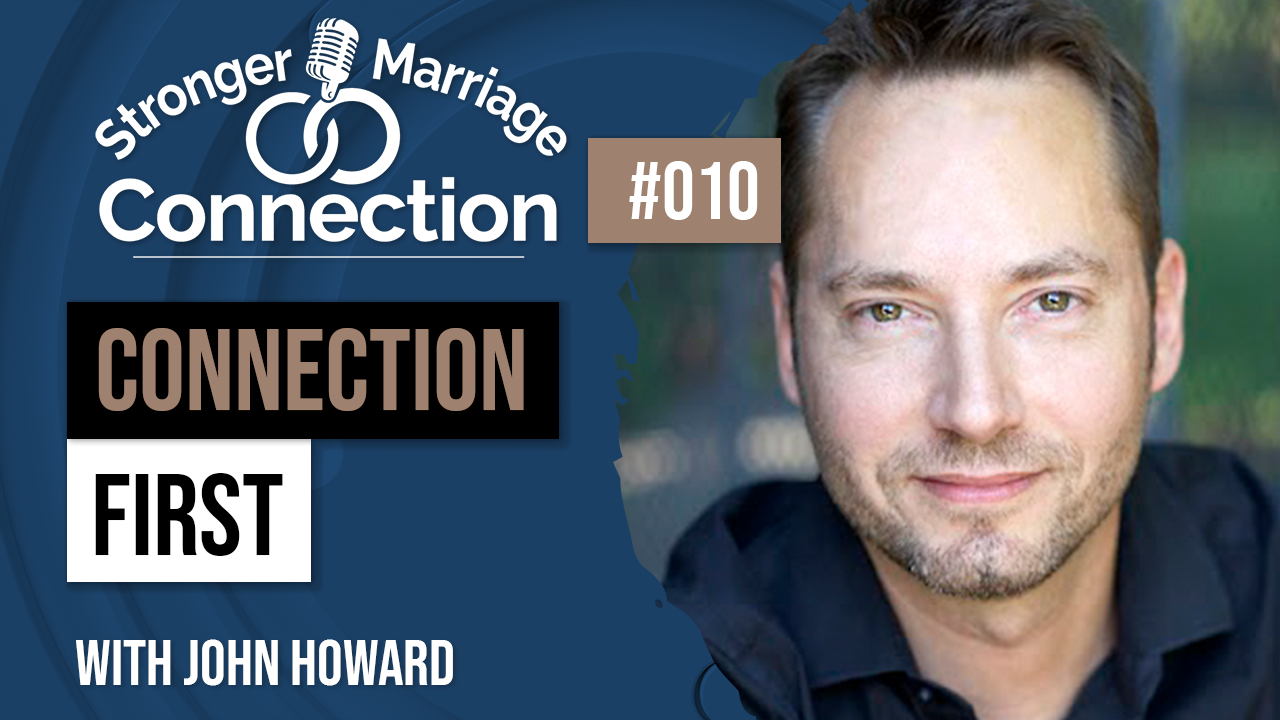010: Connection First
Podcast Guest: John Howard

Listen to the Show:
In this Episode
In this week’s episode, our expert guest, John Howard, talks about his book, More Than Words: The Science of Deepening Love and Connection in Any Relationship, and shares what neuroscience is teaching us about emphasizing connection over communication. With tips for parents and couples, John’s insights help the listener refocus on connection for the benefit of ourselves, our marriages, families, and society. Join us for the conversation and learn how to create a deeper connection in your marriage today.
0:00 – Introduction: Who is John Howard?
2:37 – Brain science in couple’s therapy
3:37 – Communication is out and connection is in
6:12 – Connecting through vulnerability: Why won’t he talk to me?
8:08 – Connection Hacks AKA the language of the nervous system
9:30 – Our non-verbal communication speaks louder than words
9:55 – When NOT to have sensitive conversations?
11:35 – Moving beyond “I” statements to “we” statements
14:30 – Skills matter more than compatibility
17:55 – Simple strategies to connect with your partner
19:45 – Altering verbal communication into nonverbal connection
22:33 – Getting on the same level with my children
24:00 – Connect, direct, and then correct
24:45 – Bridging marital blind spots with my partner
25:54 – Having the humility to constantly be learning
27:20 – The personal strength that comes from healthily digesting feedback
29:33 – Is bad intent inherent in bad behavior?
32:45 – Seeing the world through your partner’s eyes: Merging societal polarization
35:34 – Introduction to John’s book More than Words.
39:29 – Refocusing your attention towards building connection
41:20 – Refrain from assigning intent to your partner
42:16 – How accepting diverse influences in life will benefit our connection
43:31 – The key to a stronger marriage connection
About John Howard
John is a Cuban-American who grew up in New York City speaking Spanish. He didn't live with his parents as a kid and eventually left home at 15. After years of traveling and studying native traditions, John discovered the science of relationships as a powerful way to heal his own attachment wounds. He has taught the neuroscience of couples therapy at leading conferences, has trained thousands of therapists, and led a relationship wellness program for Google, Inc. He is the Founder of the Ready Set Love® line of courses for couples, the Founder of Presence Wellness, and teaches at the Dell Medical School in Austin, TX. In 2022, John released his book, More than Words that is high grossing on BookTok and expands on the principles John has taught in his lectures and in therapy for the entirety of his career.
Links
John Howard Links:
getmorethanwords.com – Order John’s book here to receive bonus content (free chapter on attachment) and connect with John personally.
John Howard’s Podcast about his book More than Words
Insights and Invites
Insights
John reminds us to be intentional with our attention – putting away our devices and distractions and really focusing on our partners. He indicates that one of the best ways to do this is by “stepping in the shoes” of our partner and practicing humility. By refraining from making assumptions about our partner, John illustrates that couples will grow stronger bonds that are focused on simple forms of connection and affirmations that will make all the difference to one’s relational satisfaction.
Invites
- Practice nonverbal, primitive connection with your partner
- Sit with your partner and take turns holding each other without talking for 2 minutes.
- Sit across from each other and look into each other’s eyes without speaking.
- Write down ways you “really care” about your partner in a journal across from each other and then share what your insights with your partner.
- Hold your partner’s hand for 5-10 minutes without talking and then discuss what you appreciate about your partner.
- “Merge your marriage” by taking the RELATE assessment with your partner. Have a discussion together after taking the assessment and learn how “to see it from your partner’s point of view.” Though how you view things, or do things, may be different, practice validating your partner’s point of view and discover a new way you can develop your relationship going forward.
- Practice skills-based connection
- Discuss with your partner what you view as “bad behavior” and why. Establish ways you can remedy this kind of behavior together.
- Write in a journal entry what makes you compatible with your partner. What do you love about them? Also, highlight your differences. List five ways you can connect with your partner that illustrate your differences and will help you grow together.
- Have a conversation with your partner about how to approach challenges in your relationship with greater intentionality and commitment. Develop strategies that will lead to conflict resolution and connection. For lots of great conflict resolution strategies and tools, take the ePREP course offered free to Utah residents by the Utah Marriage Commission or visit UMC’s Tiktok for quick conflict resolution tips.
Visit our site for FREE relationship resources and regular giveaways:
Facebook: StrongerMarriage.org
Instagram: @strongermarriagelife
Dr. Dave Schramm:
Facebook:
https://www.facebook.com/DrDaveUSU
Facebook Marriage Group:
https://www.facebook.com/groups/770019130329579
Facebook Parenting Group:
https://www.facebook.com/groups/542067440314642
Dr. Liz Hale:

